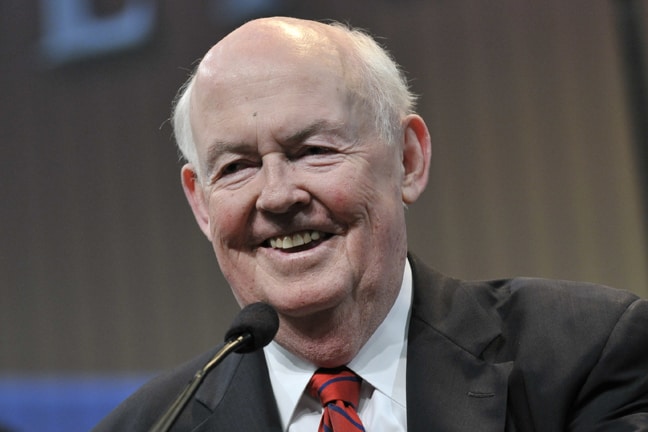President Emeritus SEIU and Senior Fellow Economic Security Project.
Brishen Rogers’ thoughtful piece: Why UBI Proponents Should Support Labor Law Reform was a good read and I would like to respond.
First, there are many reasons for everyone to support reform of 80-year-old labor laws in today’s changed environment on jobs and work. When I was President, SEIU was a leading proponent of both State and Federal labor law changes. Recently I authored with a conservative think tank leader, Eli Lehrer from R Street, a proposal in National Affairs to mirror the Medicaid waiver process allowing for state experiments with labor law reforms.
Workers always do better when there are strong organizations fighting with them for a $15 minimum wage, health care reform, paid leave or good jobs whether through collective bargaining or public policy and legislation. But as unions grow smaller, they will not grow stronger, and unions’ ability to lead these movements will get tougher and we need to broaden our thinking on workers organizations.
While there are many reasons that anyone who believes in economic stability and security and worker voice should support labor law reforms, we need to strategically accept that UBI and labor law reform are two distinct ideas, and are neither mutually exclusive nor inclusive.
UBI, like Obamacare, will not be won from a “progressive only” perspective. Odd coalitions of health and non-healthcare businesses, religious conservatives, ideologically diverse academics and think tanks, health professionals, public health advocates, and organizations supporting treatments of specific diseases like cancer, joined unions and civil rights organizations to create the public will for change. UBI has the potential for another combination of odd alliances that should be promoted, respected, and accepted if we want to win as massive a change as ending poverty by giving people cash – as Martin Luther King Jr. espoused as the preferred anti-poverty program.
My thoughts on some of Rogers’ other comments:
“If means-tested welfare benefits are eliminated, the poor may end up with fewer overall resources.”
We should never support a change in social welfare benefits that makes things worse for people, nor should we ever be afraid to fight for something better because we are scared that we will lose more. You cannot make progress playing defense, and we need to adopt a winner’s not loser’s mentality about change.
“Moreover, Social Security and Medicare may be far cheaper to manage than their private sector analogues due to economies of scale.”
I totally agree, and if we could get our health care expenditures equal to our OECD counterparts, e.g. Medicare For All, we could find lots of the money needed to fund UBI.
“The price tag would be borne not just by the extremely wealthy, but also by a group that is much larger, and in some ways more politically powerful: the top 20% of the income distribution.”
Rogers has reinforced my case for not funding UBI with taxes on income (simply because it does not provide enough money anyway to solve the problem for the powerful opposition it draws). My book outlines a series of ideas to fund a UBI including a financial transaction tax; carbon taxes, repurposing some of the $1.2 trillion in tax expenditures, a VAT or asset tax, and I now would add Bill Gates robot tax and President Trump’s border adjustment tax, and this would avoid using income taxes as the central funding mechanism.
“So if any UBI were passed tomorrow, the wealthy and the upper-middle class would surely push for its repeal. We could then end up with no UBI, no social insurance, and no welfare benefits, which would be a disaster.”
Reminder: that is the loser mentality! The labor movement thought that way for over 30 years prior to 2009, and did not support or introduce labor law reform legislation at the Federal level, and you see where they got us. Time to think like a winner!
“In the U.S., this suggests that getting to a progressive UBI requires steering the economy and the class structure in a more egalitarian direction over decades, not years. The political coalition capable of driving such a change would surely include unions, civil rights organizations, religious progressives, and newer progressive organizations such as MoveOn and Indivisibles. The policies should include baby steps toward a UBI such as unconditional child allowances – which, notably, most Scandinavian countries have adopted.”
That was the strategic argument of many regarding health care reform and it did not work. It took a broader based coalition than progressives, and change was taken in one large step over the objections of people who believed that baby steps were a better approach. We would still be waiting to cover the over 20 million people if we had chosen incremental reform. The same big leap, quick-change approach guided the victorious effort to marriage equality substantially skipping over civil unions!
“How to achieve income compression? Raising the minimum wage to $15 per hour…”
Amen for now. But as nearly 40% of the workforce has no fulltime employer or any employer or job at all, $15 will have less impact over time, but it is an effort that deserves major support.
“So to sum up: rather than pushing for a UBI in hopes it would alter our political economy, we should be building the sort of political economy that can make a progressive UBI possible.”
No, rather than thinking we cannot operate in multiple dimensions, we should pursue a series of goals that change workers lives through collective bargaining, legislation, and ultimately attain the big win: a UBI that ends poverty and organizations that exercise power for workers.










Daily News & Commentary
Start your day with our roundup of the latest labor developments. See all
February 23
In today’s news and commentary, the Trump administration proposes a rule limiting employment authorization for asylum seekers and Matt Bruenig introduces a new LLM tool analyzing employer rules under Stericycle. Law360 reports that the Trump administration proposed a rule on Friday that would change the employment authorization process for asylum seekers. Under the proposed rule, […]
February 22
A petition for certiorari in Bivens v. Zep, New York nurses end their historic six-week-strike, and Professor Block argues for just cause protections in New York City.
February 20
An analysis of the Board's decisions since regaining a quorum; 5th Circuit dissent criticizes Wright Line, Thryv.
February 19
Union membership increases slightly; Washington farmworker bill fails to make it out of committee; and unions in Argentina are on strike protesting President Milei’s labor reform bill.
February 18
A ruling against forced labor in CO prisons; business coalition lacks standing to challenge captive audience ban; labor unions to participate in rent strike in MN
February 17
San Francisco teachers’ strike ends; EEOC releases new guidance on telework; NFL must litigate discrimination and retaliation claims.